|
|
|
Sort Order |
|
|
|
Items / Page
|
|
|
|
|
|
|
| Srl | Item |
| 1 |
ID:
140332
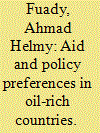

|
|
|
|
|
| Summary/Abstract |
This paper analyses the role of foreign aid in assisting development in two oil-rich countries: Indonesia and Nigeria. It seeks to understand the way foreign aid provided assistance to transform Indonesia from a ‘fragile’ state in the 1960s into one of the ‘Asian Tigers’ in the mid-1990s, and why it did not prevent Nigeria from falling into ‘African Tragedy’. The paper argues that foreign aid may help not only to finance development, but also to navigate policy makers’ policy choices. It shows how foreign aid may or may not help policy makers turn their policy preferences into action.
|
|
|
|
|
|
|
|
|
|
|
|
|
|
|
|
| 2 |
ID:
140331
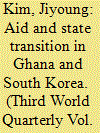

|
|
|
|
|
| Summary/Abstract |
This paper examines the questions of why and how foreign assistance was utilised successfully in South Korea but less so in Ghana, with a focus on the role of aid in the process of state building and state transition in these two countries. As multiple policy makers and scholars have noted, in 1957 South Korea and Ghana shared similar levels of GDP per capita, yet South Korea then achieved rapid economic development and democracy in one generation, while Ghana suffered from slow development and a general deterioration of the standard of living. In this study I adopt a comparative historical research method to explain the divergent paths of these two countries, with a special focus on the impact of foreign assistance on state transitions. I argue that contextual factors – including the effect of the colonial legacy in each of these two regions in shaping modern states, and the specific characteristics of foreign assistance intervention – provide useful insights in explaining the differential impact of aid on state building and state transition in Ghana and in South Korea.
|
|
|
|
|
|
|
|
|
|
|
|
|
|
|
|
| 3 |
ID:
140334
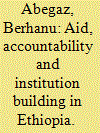

|
|
|
|
|
| Summary/Abstract |
Forty billion dollars of ODA over the past two decades has reduced destitution in post-socialist and post-conflict Ethiopia. It has also boosted the technocratic capacity of exclusionary state institutions, while doubly enfeebling the fledgling private sector and independent political and civic organisations. This aid–institution paradox is a product of an alignment of donor–recipient strategic interests. The five major donors pursued geopolitical and poverty reduction objectives; and the narrowly based ruling elite sought total capture of the state, ownership of the development agenda and use of pro-poor growth to leverage large aid inflows and to seek domestic political legitimacy. By coupling poverty reduction with adequate space for inclusive market, civic and political engagement, a farsighted coalition of donors could have complemented capacity building with the promotion of state resilience. Scaled-up aid can still be delivered, as in Eastern Europe, conditional on meaningful mutual accountability and the rule of law.
|
|
|
|
|
|
|
|
|
|
|
|
|
|
|
|
| 4 |
ID:
140329
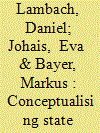

|
|
|
|
|
| Summary/Abstract |
This paper proposes a theoretically grounded and methodologically rigorous conceptualisation of state collapse. It seeks to overcome several key deficits of research into fragile, failed and collapsed states, which is often criticised as normatively problematic and methodologically deficient. We argue that this is a worthwhile topic to study but that scholarly inquiry needs to become more systematic and focus on extreme cases of state collapse. Following a Weberian institutionalist tradition, we disaggregate statehood into three dimensions of state capacity: making and enforcing binding rules, monopolising the means of violence and collecting taxes. We then propose a set of indicators as well as a mode of aggregation based on necessary and sufficient conditions. Our framework identifies 17 cases of state collapse in the postcolonial era.
|
|
|
|
|
|
|
|
|
|
|
|
|
|
|
|
| 5 |
ID:
140333
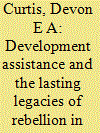

|
|
|
|
|
| Summary/Abstract |
Rwanda and Burundi have both emerged from civil wars over the past 20 years and foreign donors have provided significant contributions to post-conflict reconstruction and development in the two countries. Yet, although Rwanda and Burundi share several important characteristics, their post-conflict social, political and economic trajectories have been different. This article argues that the nature of the ruling parties in Rwanda and Burundi is key to understanding the countries’ relationships with donors. Rather than seeing aid as an exogenous factor, causing particular development outcomes, it shows how local party elites exert considerable agency over the aid relationship. This agency is influenced by a number of different local contextual factors, including how the parties were established, how they evolved and the ways in which their civil wars ended. Thus, the article provides an analysis of how local context matters in understanding donor–recipient aid relationships, and how the ruling party in Rwanda (the RPF) and in Burundi (the CNDD–FDD) emerged from their respective conflicts with different relationships with international donors.
|
|
|
|
|
|
|
|
|
|
|
|
|
|
|
|
| 6 |
ID:
140328
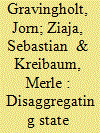

|
|
|
|
|
| Summary/Abstract |
This conceptual and methodological article makes the case for a multidimensional empirical typology of state fragility. It presents a framework that defines fragile statehood as deficiencies in one or more of the core functions of the state: authority, capacity and legitimacy. Unlike available indices of state fragility, it suggests a route towards operationalisation that maintains this multidimensionality. The methodology presented should help in future research to identify clusters of countries that exhibit similar constellations of statehood, whereby ‘constellation’ refers to the specific mix of characteristics across the three dimensions. Such an identification of empirical types would fulfil a demand that exists both in academic research and among policy circles for finding a more realistic model of fragility at an intermediate level between single-case analyses and the far-too-broad category of state fragility.
|
|
|
|
|
|
|
|
|
|
|
|
|
|
|
|
| 7 |
ID:
140330


|
|
|
|
|
| Summary/Abstract |
This article uses the Country Indicators for Foreign Policy (CIFP) fragile states framework to evaluate fragile state transitions. Our objective is to find out why some states considered fragile have recovered, while others remain fragile for long periods. We identify three categories of countries: those in a fragility trap, those that have exited it, and those that fluctuate between fragility and stability. CIFP data are used to examine state transitions for each category. One state from each category is then subjected to further country-level analysis. Our findings reinforce the view that state transitions do not follow a unique path and that effective engagement in fragile states requires different approaches across cases.
|
|
|
|
|
|
|
|
|
|
|
|
|
|
|
|
| 8 |
ID:
140327
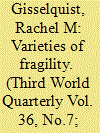

|
|
|
|
|
| Summary/Abstract |
Aid to fragile states is a major topic for international development. This article explores how unpacking fragility and studying its dimensions and forms can help to develop policy-relevant understandings of how states become more resilient and the role of aid therein. It highlights the particular challenges for donors in dealing with chronically fragile states and those with weak legitimacy, as well as how unpacking fragility can provide traction on how to take ‘local context’ into account. It draws in particular on the contributions to this special issue to provide examples from new analysis of particular fragile state transitions and cross-national perspectives.
|
|
|
|
|
|
|
|
|
|
|
|
|
|
|
|
|
|
|
|
|